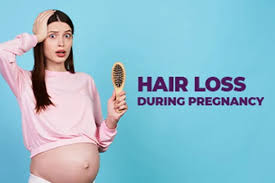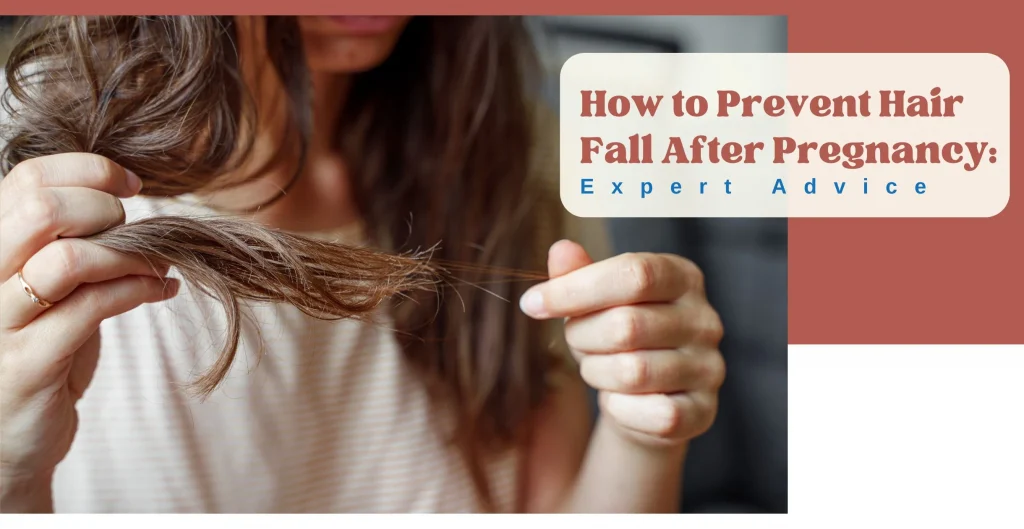Pregnancy is that miraculous journey of happiness, pleasure, and constant changes happening inside a woman’s body. One change that strikes a woman in shock and frightens her more during pregnancy is hair loss. Reasons for hair loss during pregnancy, association with pregnancy, and guidelines regarding management of postnatal hair loss and hair loss after delivery are described later.

What Triggers Hair Loss During Pregnancy?
Hair loss in pregnant women arises due to numerous reasons including hormonal fluctuations, stress and nutrition deficiencies. For this method to be helpful there are some points that ought to be understood on this area of consideration:
1. Hormonal Changes:
Pregnancy causes lots of a hormonal imbalances in the body of a woman. Although pregnancy in general leads to increased estrogen in the body and most of the time tends to cause hair growth while pushing the time of hair fall, it may lead to the thinning of hair among some women due to the hormonal imbalance. If a pregnant woman, or any person in that matter or the levels of some other hormones are relatively low, then they generally experience hair loss during pregnancy.
2. Stress:
This is very stressful in physical and emotional manners. Stress triggers telogen effluvium also, which shifts more hair follicles into the shedding phase. The condition of this may easily cause someone to appear rather obviously bald during pregnancy.
3. Nutritional Deficiencies:
In pregnancy, there will be requirements of absorption for some nutrients for the baby, which means inadequate nutrition is primarily a reason that leads to the condition of hair loss while pregnant for most females. The important causes of low nutrition in many are iron, protein deficiency coupled with biotin deficiency.
Hair Loss While Pregnant: Is It Normal?
It’s not very common to have hair loss during pregnancy. Hormones during the time of pregnancy act as a hair growth factor for some while it may result in thinning hair while pregnant for others. Minor hair loss in most cases proves to be reversible and subsides after delivery; hair loss beyond this threshold of normal should be reported to a physician.
Hair loss after childbirth:
Most women have hair loss after the postpartum period. After delivery, some women gain this condition in which their hormone balances normalize by the start of hair shedding as it had already been in its extended growth stage during pregnancy. Postpartum hair loss often starts during the third month after delivery. It lasts only a few months. This process is a totally natural occurrence that has no features of a dangerous pathology at all.
Managing and Preventing Pregnancy Hair Loss
Hair Fall at pregnancy can hardly be avoided but the following information will reduce the negative influence it exerts and help with further healthy hair development:
- Eating Healthy and Well-Balanced Food – A healthy diet will avoid pregnancy hair loss. The main nutrients include iron, zinc, biotin, and vitamins A, C, D, and E. Include leafy greens, nuts, seeds, eggs, and fish in your diet.
- Hydration – Plenty of water keeps one in general good health, and hair follicles hydrated, so the risk of thinning hair while pregnant is lessened.
- Gentle Hair Care – Minimize harsh hair treatments, overexposure to hot heat styles, and tight hairstyles. One must use a gentle, sulfate-free shampoo and conditioner to prevent pregnancy hair loss.
- Maintain Stress Management – Relaxation techniques through yoga, meditation, or pre-natal exercise help in decreasing stress levels during pregnancy, and therefore preventing hair loss while pregnant.
- Take Prenatal Vitamins – Prenatal vitamins consist of nutrients like folic acid, iron, and biotin that may be taken to reduce thinning hair while pregnant and lead to overall health.

Effective Remedies for Postpartum Hair Loss
Sometimes, remedies for postpartum hair loss are effective. The temporary phase can be minimized and encourage hair regrowth.
1. Take Natural Oils:
Massaging the scalp with coconut oil, almond oil, or castor oil improves blood circulation and grows healthy hair.
2. Get a Haircut:
A short haircut will make hair appear thicker and less noticeable for post-pregnancy hair loss.
3. Take Supplements:
If your doctor recommends it, supplements like biotin or omega-3 fatty acids can help fight postpartum hair loss.
4. Be Patient:
Temporary hair loss usually occurs after a woman gives birth. In many cases, hair is expected to recover its original pattern of growth sooner or later.
When to Visit a Health Care Provider
You should consult with a health care provider when experiencing significant hair loss during pregnancy or persistent hair loss after childbirth. Contributing conditions can include disorders of the thyroid, alopecia, and similar ailments, requiring attention from medical practitioners.
Conclusion
It can indeed be alarming having hair loss during pregnancy, but most of the time it is only temporary and entirely within control. Being aware of the causes as well as adopting good lifestyle habits ensures that hair shedding during pregnancy may be kept minimal and that what happens after the postpartum is managed. Not all women’s experiences are alike, so see a professional in case of needing guidance.
Hair loss, whether it occurs in pregnancy time or after that, needs to be handled patiently and with utmost care. Take pride in this beautiful life period and enjoy this beautiful life stage confidently knowing that your hair might glow back later.